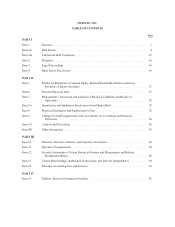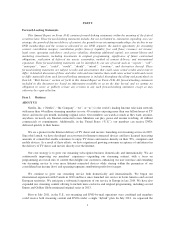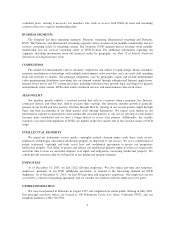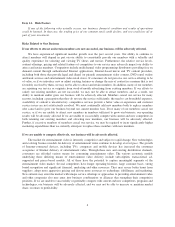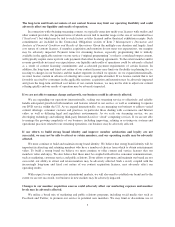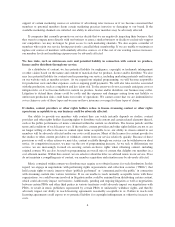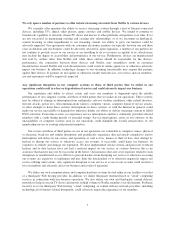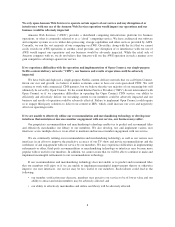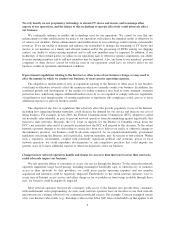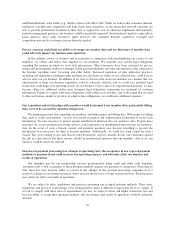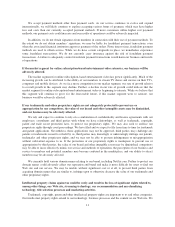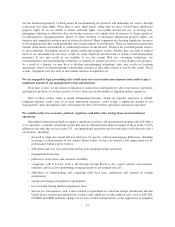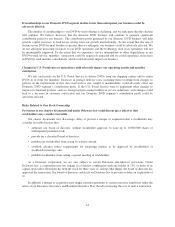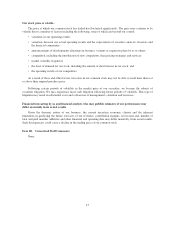NetFlix 2013 Annual Report Download - page 12
Download and view the complete annual report
Please find page 12 of the 2013 NetFlix annual report below. You can navigate through the pages in the report by either clicking on the pages listed below, or by using the keyword search tool below to find specific information within the annual report.unaffiliated Internet video traffic (e.g., Netflix videos to the Xbox 360). While we believe that consumer demand,
regulatory oversight and competition will help check these incentives, to the extent that network operators are
able to provide preferential treatment to their data as opposed to ours or otherwise implement discriminatory
network management practices, our business could be negatively impacted. In international markets, especially in
Latin America, these same incentives apply however, the consumer demand, regulatory oversight and
competition may not be as strong as in our domestic market.
Privacy concerns could limit our ability to leverage our member data and our disclosure of member data
could adversely impact our business and reputation.
In the ordinary course of business and in particular in connection with merchandising our service to our
members, we collect and utilize data supplied by our members. We currently face certain legal obligations
regarding the manner in which we treat such information. Other businesses have been criticized by privacy
groups and governmental bodies for attempts to link personal identities and other information to data collected on
the Internet regarding users’ browsing and other habits. Increased regulation of data utilization practices,
including self-regulation or findings under existing laws, that limit our ability to use collected data, could have an
adverse effect on our business. In addition, if we were to disclose data about our members in a manner that was
objectionable to them, our business reputation could be adversely affected, and we could face potential legal
claims that could impact our operating results. As our business evolves and as we expand internationally, we may
become subject to additional and/or more stringent legal obligations concerning our treatment of customer
information. Failure to comply with these obligations could subject us to liability, and to the extent that we need
to alter our business model or practices to adapt to these obligations, we could incur additional expenses.
Our reputation and relationships with members would be harmed if our member data, particularly billing
data, were to be accessed by unauthorized persons.
We maintain personal data regarding our members, including names and billing data. With respect to billing
data, such as credit card numbers, we rely on licensed encryption and authentication technology to secure such
information. We take measures to protect against unauthorized intrusion into our members’ data. Despite these
measures, we, or our payment processing services, could experience an unauthorized intrusion into our members’
data. In the event of such a breach, current and potential members may become unwilling to provide the
information to us necessary for them to become members. Additionally, we could face legal claims for such a
breach. The costs relating to any data breach could be material, and we currently do not carry insurance against
the risk of a data breach. For these reasons, should an unauthorized intrusion into our members’ data occur, our
business could be adversely affected.
Increases in payment processing fees, changes to operating rules, the acceptance of new types of payment
methods or payment fraud could increase our operating expenses and adversely affect our business and
results of operations.
Our members pay for our membership services predominately using credit and debit cards (together,
“payment cards”). Our acceptance of these payment methods requires our payment of certain fees. From time to
time, these fees may increase, either as a result of rate changes by the payment processing companies or as a
result of a change in our business practices which increase the fees on a cost-per-transaction basis. Such increases
may adversely affect our results of operations.
We are subject to rules, regulations and practices governing our accepted payment methods. These rules,
regulations and practices could change or be reinterpreted to make it difficult or impossible for us to comply. If
we fail to comply with these rules or requirements, we may be subject to fines and higher transaction fees and
lose our ability to accept these payment methods, and our business and results of operations would be adversely
affected.
10


